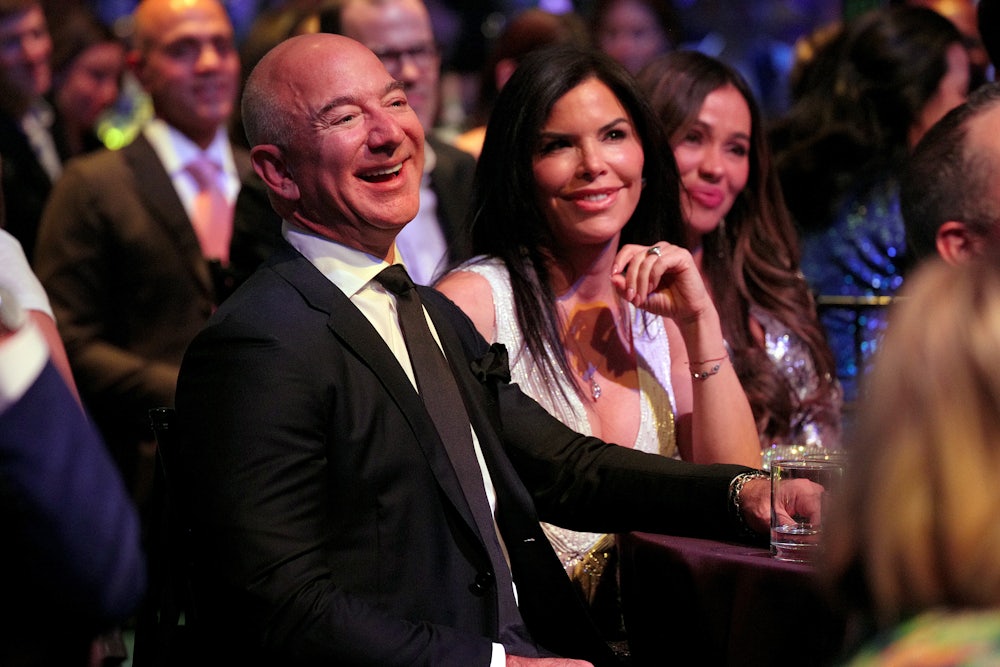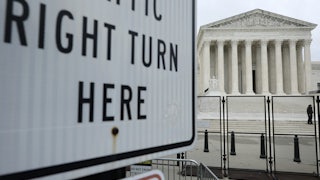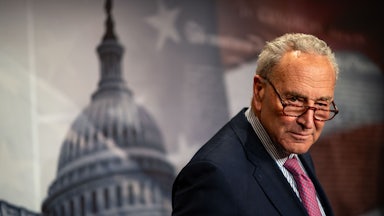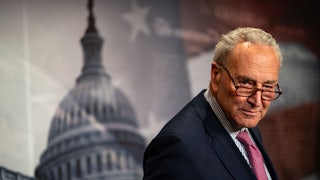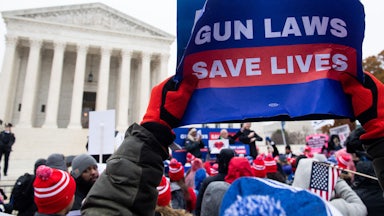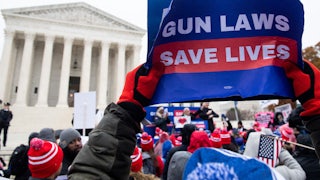You have to wonder about fiscal policy in any country where “Rich People Pay Taxes” is big news. In the United States, the default presumption is that rich people don’t pay taxes. As ProPublica reported last year, Jeff Bezos, the world’s richest man, paid no federal income tax in 2007, 2011, or 2018. Neither, in 2018, did the world’s second-richest man, Elon Musk. Yet tax receipts this year are expected to reach $2.6 trillion, according to the Congressional Budget Office. That’s a 26 percent increase over receipts in 2021. These projected tax receipts would constitute 10.6 percent of gross domestic product, the highest proportion ever recorded, and would shrink the budget deficit from last year’s $2.8 trillion to $1 trillion. And according to a report Sunday by The Wall Street Journal’s Richard Rubin and Amara Omeokwe, rich people are probably driving the trend.
I don’t mean superrich people like Bezos and Musk; I mean people like the affluent readers of The Wall Street Journal. With an average household income of $242,007, Wall Street Journal readers can be defined, broadly, as the top 5 percent in the nation’s income distribution. Let’s call this cohort the five percenters. A blog post last month by Alexander Arnon, associate director of policy analysis for University of Pennsylvania’s Penn Wharton Budget Model, observed an enormous surge in “nonwithheld individual income tax,” which probably means financial income, since a portion of payroll income is withheld for taxes. (For all you hear about the gig economy, most of us still work for The Man.) The source, Arnon says, is 2021’s “unprecedented surge in financial income.” The beneficiaries included a lot of five percenters.
You don’t pay taxes on capital gains until you cash out. Combine the revenue surge with the fact that for most of 2021 the personal savings rate dropped like a stone, and it’s hard to avoid concluding that five percenters spent a lot of cash last year. Granted, some portion was spent buying other stocks. But another portion was spent buying goods and services, and given that personal consumption rose 13 percent in 2021, that portion was probably significant.
Am I speculating? Sure, a little. But there’s no shortage of anecdotal evidence that as the five percenters’ stock portfolios took off, they went on a remodeling binge and treated themselves to vacations they’d canceled in 2020. We may lack data to quantify it, but if you come in contact regularly with members of the professional class who were largely unaffected by Covid-19’s economic turmoil, you’ve probably observed them letting loose a bit financially.
To repeat: These five percenters probably don’t include Jeff Bezos or Elon Musk. Bezos and Musk belong to the non-tax-paying class; even in the years when they pay something, it’s not usually very much. When you’re that rich, a run-up in stock prices isn’t likely to increase your personal consumption level, because it’s already sky-high. There’s no great reason to judge Bezos and Musk guilty of driving inflation to anything like the extent the five percenters did. (Bezos and Musk are guilty of plenty else, and it’s a scandal they pay so little in taxes, but that’s a story for another day.)
I mention Bezos because last month he flamed President Joe Biden on Twitter about taxes. “You want to bring down inflation?” Biden had tweeted. “Let’s make sure the wealthiest corporations pay their fair share.” Bezos replied that this was a non sequitur. “Raising corp taxes is fine to discuss,” Bezos tweeted. “Taming inflation is critical to discuss. Mushing them together is just misdirection.” Bezos later tweeted three times more, emphasizing that linking inflation with wealthy people was “misdirection.”
But it isn’t. “It’s always been in the textbook that tax increases reduce demand,” Harvard economist (and well-known inflation hawk) Lawrence H. Summers told me. It’s true! I consulted the most famous economics textbook ever written, the one penned by Summers’s uncle, Paul Samuelson, in 1948, and revised many times thereafter (my copy, in 1970). Let’s turn to page 339:
We have seen that a progressive income-tax structure results in vast increases in tax revenues when incomes grow. Thus, every year that the American economy shows 6 or 7 per cent growth in money … the government collects about $15 billion extra [or $115 billion extra in 2022 dollars] of revenue. Every year! Since existing government expenditures do not automatically grow by this amount, we are provided in effect with a “fiscal dividend” that can be used for public purposes.
If inflation is taking place, this built-in stabilizer is a great thing—just what the doctor ordered.
After the Bezos dustup, Summers weighed in on Twitter:
I think @JeffBezos is mostly wrong in his recent attack on the @JoeBiden Admin. It is perfectly reasonable to believe, as I do and @POTUS asserts, that we should raise taxes to reduce demand to contain inflation and that the increases should be as progressive as possible.
Summers later added that he believed this even though he rejects “rhetoric about inflation caused by corporate gouging as preposterous.”
Summers later explained to me in an email that he didn’t mean to suggest “more progressive [taxation] was better for inflation, just that it was better tax policy” for fairness and other reasons. There is, Summers conceded, “some possibility that a marginal dollar of progressive tax increase does a bit less to reduce demand” than a marginal dollar tax increase on the middle class. Middle-class people, because they have less income than wealthy people, spend more of that income on goods and services. Also, there are more of them. That’s why, when President Donald Trump and then Biden wanted to stimulate the economy during the Covid pandemic, they targeted stimulus checks to the middle class. But, Summers said, “economists generally would agree that progressive tax increases do indeed reduce demand.”
Biden wants to fight inflation with a corporate tax of 28 percent, up from the present 21 percent (but lower than the 35 percent top marginal rate in place before Trump lowered it). Biden has also proposed a top marginal income tax rate of 39.6 percent, up from the present 37 percent (but lower than the 50 percent top marginal rate during most of the Reagan administration, the 70 percent top marginal rate during most of the 16 years preceding Reagan’s election, and the 91 percent top marginal rate during the Eisenhower administration). Biden has also proposed a tax on billionaires like Bezos that targets unrealized capital gains.
Bezos said such policies don’t have anything to do with inflation, but he was wrong. Biden’s proposed 39.6 percent marginal rate would tax income above $400,000, which, yes, sets the floor way too high but would nonetheless capture a good chunk of those free-spending five percenters. As for the corporate rate, Summers explained, it’s generally assumed “that every dollar of stock market wealth generates between 3 and 5 cents of extra consumption.” Which isn’t nothing. “Everyone would agree,” Summers said, “that progressive taxes reduce demand by something.”
One likely reason for 2021’s surge in revenue was investors’ expectation last year that a capital gains increase would be included in the Build Back Better bill that many of us assumed (wrongly) would pass in some form. “If you thought that the capital gains rate was going to go up in 2022,” Summers told me, “you would sell in 2021.” Now we’re left with the inflationary effect of an expected tax hike without the tax hike itself. That’s the worst of both worlds.
How are the five percenters allocating their wealth in 2022? On the one hand, it’s unlikely there will be any capital gains hike in 2023 because the Democrats will probably lose what little control of Congress Democratic Senators Joe Manchin and Kyrsten Sinema allow them now. That leaves the five percenters with no reason to engage in another defensive stock sell-off. On the other hand, the capital gains rate will remain 21 percent—so low that the penalty for selling off stock won’t do much to dampen any impulses the five percent have to continue consuming. (Their chief obstacle now will be that stock prices have fallen.) When you’re even moderately rich, it’s never really a bad time to repaper the living room or to vacation in Crete. That means it’s never really a bad time to increase five percenters’ taxes and discourage such inflationary consumption at the margins. It would make the tax system a bit fairer, it would lower the deficit, and it might lend the Federal Reserve a helping hand in bringing down the inflation rate. It sure as hell wouldn’t hurt.
